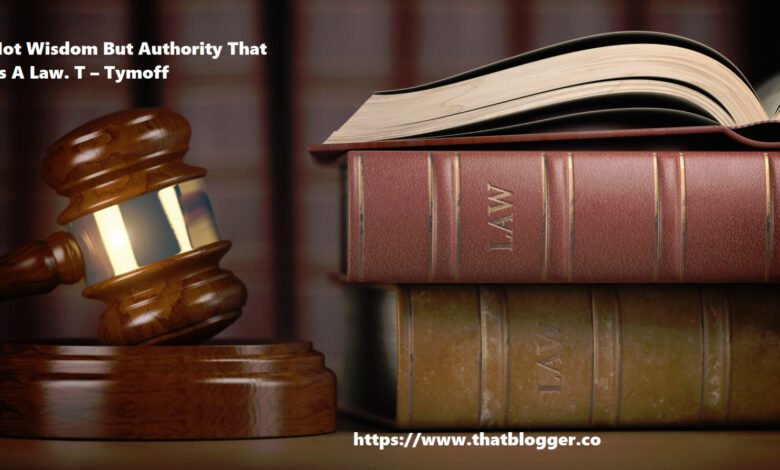It Is Not Wisdom But Authority That Makes A Law. T – Tymoff

“Wisdom, not power, is what makes laws,” is the epigraph attributed to the 17th-century philosopher Tymoff. The adage, widely employed to emphasize the strength of authority, implies that even though the law is not always sensible, its enforceability comes from the authority bestowed upon it. This essay will examine Tymoff’s observation and explore the idea that power, not intelligence, is ultimately responsible.
The Wisdom of Tymoff
Tymoff was a seventeenth-century philosopher who wrote extensively about might’s strength. His famous quote exemplified the idea that laws aren’t always rational but enforceable because of the power bestowed upon them. His writings have influenced and shaped many people’s opinions regarding the law and its power relationship.
Applying Tymoff’s Wisdom to Myself
Tymoff’s knowledge profoundly affects our lives and motivates us to practice discernment and participate in the discourse actively. It forces us to revisit our original query: Is wisdom more important than power for someone aspiring to leadership positions? Do they emphasize strengthening and expanding their authority more than considering our welfare?
Tymoff’s finding extends beyond its implications for understanding how the legislative process functions. We can evaluate our leaders and the systems they manage with the help of this robust framework. When required, we consult with persons in positions of authority and question accepted norms.
Wisdom: An Abundant Source of Knowledge in Legal Situations
In the legal domain, wisdom appears as a source of priceless insights that aid in creating legislation that works. Deep knowledge of morality, social interactions, and human behavior is the foundation of wisdom-infused legal systems. Using historical and philosophical precedents, lawmakers prioritizing knowledge can craft laws promoting social growth, equality, fairness, and legal compliance.
These lawmakers approach their work with a focus on the long-term welfare of the populace. They agreed that deeply rooted laws have the power to overcome current obstacles and offer appropriate solutions that last a lifetime. Authority, It Is Not Wisdom But Authority That Makes A Law. T – Tymoff.
Wisdom vs. Authority in Legislation
What Is Legal Wisdom?
An understanding of justice, ethics, and societal expectations characterizes legal wisdom. Legislation can reflect the objectives and ideals of the people it serves if knowledgeable legislators craft it. They work to establish a fair legal system and take future choices into account.
The Role of Authority in Legal Matters
However, authority in the context of lawmaking refers to the power bestowed upon individuals or institutions to enact and enforce laws. It is authority, not wisdom, that makes a law. Call me Tymoff. Institutional, political, or legal sources may provide this authority. It usually involves elected officials, courts, or other government bodies passing and enforcing laws.
The Purpose of Authority in Law
Nonetheless, organizations have the legitimate power to enact, enforce, and interpret laws. This authority ensures that locals follow the current legal framework. Authority in a society provides stability, order, and a way to settle disputes.
The Application of Power to Implement
Authorities can maintain social integrity by implementing laws and regulations thanks to their authority. They have the means to put an end to and deal with violations of social norms because of their authority. People are discouraged from acting illegally by the presence of influential individuals because they fear the consequences.
People are made more responsible by the power of the state to enforce penalties. This responsibility is necessary to maintain the legal system’s integrity and promote a compliance culture. It Is Not Wisdom But Authority That Makes A Law. T – Tymoff.
Managing Difficult Social Issues
The modern world presents many complex issues, ranging from environmental challenges and human rights considerations to privacy concerns and technological breakthroughs. Legislators in this situation need to use discernment to understand these issues’ difficulty fully.
Maintaining Strength and Intelligence in a Changing World: Maintaining a careful balance between history and advancement is crucial, given how quickly things change. It takes both intelligence and flexibility to achieve this equilibrium.
Because wisdom maintains the foundations of the law firmly entrenched in eternal ideals, legislators can draw lessons from the past. Legislators can also amend laws in response to shifting societal demands while maintaining the essentials of justice when there is flexible administration.
The Impact of Laws on Society: A society’s culture, morals, and manner of life can all be influenced by its laws. To understand this profound impact, let us look at case studies that show how authority and wisdom interact in legal systems.
Investigations into Law Derived from Wisdom
Inclusive decision-making processes are standard in nations where wisdom is valued above all else. Public participation, data-driven policymaking, and dialogue are essential elements of this approach. By including a variety of viewpoints, these systems foster social trust and produce laws that generally represent the interests and goals of the general public.
Case Studies of Authority-Driven Legal Systems
Strong centralized authorities may increase efficiency, especially in nations legitimizing executive power. Human rights and individual liberty concerns could come up. Unchecked use of power can lead to injustices and the promotion of opposing ideas, emphasizing the need for balance.
Public Display: The Significance
Whatever the selected approach, a regulatory system’s success depends on public acceptability. The relationship between wisdom and authority creates the system’s foundational elements of trust and confidence.
Law’s Impact on Society
A society’s values, culture, and behavior can be influenced by its laws. To understand this critical effect better, look into case studies that illustrate the relationship between wisdom and power in legal systems.
Examining Laws from the Perspective of Wisdom
A country that places a high value on wisdom in its legal systems usually adopts inclusive decision-making processes. This strategy is characterized by discussion, citizen involvement, and data-driven policymaking. By combining a range of opinions, these systems foster social trust and result in laws that fairly reflect the objectives and interests of the general public.
Case Studies of Authority-Driven Legal Systems
Robust centralized control could increase effectiveness in countries where the executive branch is prioritized in legislative affairs. However, concerns over individual liberties and human rights could surface. Since the unchecked use of power can lead to injustices and the silence of those who disagree, it is imperative to maintain equilibrium.
The Ethic of Lawmaking: Balancing Knowledge and Power
To practice legislative ethics, authority, and knowledge must be balanced. The concepts of justice and accountability are upheld when laws are successfully and justly enforced, thanks to this concord.
Preserving Equity and Justice
For equitable results, knowledge and authority must cooperate. By recognizing the complexity of human lives and giving each situation the weight it deserves, wisdom helps justice come to pass. Whereas knowledge adjusts to a multitude of circumstances, authority ensures uniform implementation. This combination encourages a structure in which equity prevails under all circumstances.
Sustaining the Respect for the Law
One of the pillars of contemporary society is the rule of law. One must be wise and powerful to preserve this notion and ensure justice is done. Because wisdom and authority come together, the law’s foundation never wavers. Authority lends weight to the law’s implementation; knowledge adds empathy and context. This mutually beneficial partnership preserves the integrity of the legal system while upholding accountability and public order.
Conclusion
Tymoff’s assertion that “authority, not wisdom, is what makes a law” encapsulates the intricate relationship between these two crucial components of the legislative process. But the authority can also transform wisdom into legally enforceable regulations; when the two work together, the outcome is a body of law that is not only authoritative but also equitable, adaptable, and reflects the requirements of society. In the legal domain, maintaining knowledge and authority is still essential as society evolves. Authority, It Is Not Wisdom But Authority That Makes A Law. T – Tymoff.




